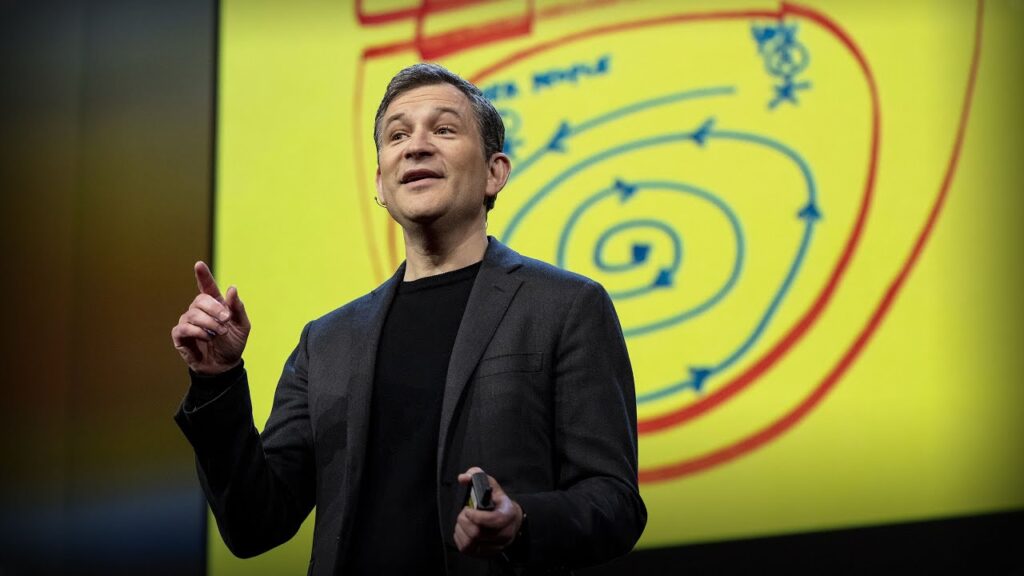Dan Harris, a former news anchor, takes us on a deeply personal and humorous journey about self-improvement, meditation, and the surprising power of self-compassion. His story serves as a reminder that transformation isn’t about perfection, but rather about embracing our flaws with kindness. Here’s a detailed breakdown of his TED Talk, filled with actionable takeaways.
The Catalyst: A 360 Review Exposes Uncomfortable Truths
Harris shares his experience with a 360 review—a feedback exercise where colleagues and loved ones anonymously critique your strengths and weaknesses. Harris’s review revealed that while meditation had improved some aspects of his personality, he still had a penchant for being rude, emotionally guarded, and self-centered. This unfiltered feedback, particularly from those close to him, was both eye-opening and deeply embarrassing.
Takeaway: Honest feedback, no matter how painful, is crucial for personal growth. Often, our worst traits are visible to everyone but ourselves.
Realization: Meditation Helps, But it’s Not a Cure-All
Meditation had helped Harris combat anxiety and depression, but his 360 review revealed that he retained the capacity to be a “schmuck.” This prompted him to seek more ways to address his lingering tendencies toward anger and self-centeredness.
Takeaway: Even with a consistent mindfulness practice, personal development is ongoing. Meditation is a tool, not a quick fix for all character flaws.
The Search for Self-Improvement: Pulling All the Levers
Determined to become a better person, Harris engaged in psychotherapy, communication coaching, couples counseling, and even bias training. But despite all his efforts, his demons of anger and self-centeredness kept surfacing.
He ultimately attended a nine-day silent meditation retreat to practice “loving-kindness,” a meditation focused on cultivating warmth and compassion for oneself and others. Although initially skeptical, Harris persisted in hopes of improving his relationships and overall demeanor.
Takeaway: Personal development is not linear. Tackling deeply ingrained behaviors requires multiple approaches—therapy, coaching, and meditation all play a part in fostering meaningful change.
The Turning Point: Radical Self-Compassion
During the retreat, Harris had an epiphany. He realized that his inner demons, anger and self-centeredness, weren’t evil—they were his mind’s way of protecting itself, a defense mechanism learned through culture and upbringing. By extending warmth and compassion to these inner struggles instead of fighting them, he experienced a profound shift. He didn’t need to “slay” his demons; he simply needed to acknowledge and soothe them.
Takeaway: Self-compassion isn’t indulgent or narcissistic; it’s a powerful form of emotional disarmament. Learning to recognize and accept your flaws is essential for growth.
The Power of Two Spirals: Self-Flagellation vs. Self-Love
Harris introduces two metaphorical spirals: the toilet vortex and the cheesy upward spiral. The toilet vortex begins with self-criticism, leading to negative interactions with others, and ultimately worsening one’s mood and relationships. On the other hand, the cheesy upward spiral starts with self-compassion, which enhances relationships and improves inner well-being.
Takeaway: Being kind to yourself fosters healthier, happier relationships. When we stop being so hard on ourselves, it positively impacts how we treat others.
Actionable Tips for Upping Your ‘Love Game’
Harris emphasizes that self-love is not selfish; it’s the foundation for loving others better. He also asserts that love, like any skill, can be trained. He shares two simple yet effective practices:
a) Loving-Kindness Meditation
A few minutes, a couple of times a week, can make a difference. Start by visualizing someone easy to love, like a friend or pet, and mentally repeat these four phrases:
- May you be happy.
- May you be safe.
- May you be healthy.
- May you live with ease.
Once you generate warmth, turn this practice toward yourself, offering the same kindness inward.
b) High-Five Your Demons
Instead of criticizing your flaws, greet them with understanding. Harris’s radical moment came when he placed his hand on his heart and offered himself the compassion he often reserves for others. This small act of self-kindness was a breakthrough in his journey of personal growth.
Takeaway: Practicing loving-kindness meditation and high-fiving your inner demons helps build self-compassion, which ultimately makes you more compassionate toward others.
The Broader Implications: A Global Call for Self-Improvement
Harris concludes by connecting personal development with larger societal issues. Our failure to care for ourselves and others, he argues, is at the root of many global problems—from inequality to climate change. While structural change is necessary, it starts with individuals learning to love themselves and, by extension, each other.
Takeaway: There’s a global need for self-improvement and compassion. If we get our “inner weather” in check, we’ll be better equipped to solve the world’s most pressing issues.
Final Thoughts: “Me, A Love Story”
Dan Harris’s talk is a humorous yet profound reflection on self-compassion, personal development, and the societal ripple effect of our inner battles. The main message? By learning to love ourselves—flaws and all—we can create a kinder, more connected world. Start with small actions like loving-kindness meditation and self-compassionate gestures, and watch your relationships and the world around you improve.
You Might Also Like:
- Discover Your Next Great Read: New York Times Best-Selling Books
- 7 Must-Read Books Before Turning 25
- Crack the Code to Wealth: “The Algebra of Wealth” by Scott Galloway
- Discovering True Wealth in The Book ‘The Wealth Money Cannot Buy’ by Robin Sharma (Book Summary)
- Book Summary: Just the Good Stuff by Jim VandeHei – Redefining Success
- 7 Must-Read Books for Money Management
